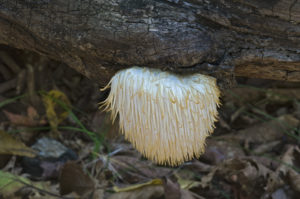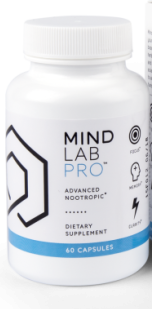Table of Contents
Lion’s Mane (Hericium erinaceus) is unique in the mushroom family both in appearance and function. Lion’s Mane Mushroom is extremely effective at stimulating Nerve Growth Factor (NGF) in the brain.
Known for its powerful effects as a “brain tonic”, Lion’s Mane is said to have been used as a tea for thousands of years by Buddhist monks. To enhance brain power, and heighten their ability to focus during meditation.
Lion’s Mane as a nootropic, is a powerful catalyst for brain cell regeneration helping improve memory and cognition.
The primary active compounds in Lion’s Mane are hericenones and erinacines. Erinacines help your brain produce more Nerve Growth Factor. Erinacines easily cross the blood-brain barrier to boost the production of neurons.
Lion’s Mane helps:
- Nerve Growth Factor. Lion’s Mane Mushroom prevents and treats nerve damage in the brain. Once past the blood-brain barrier, Lion’s Mane stimulates enzyme production that release Nerve Growth Factor (NGF). Nerve regeneration helps relieve neurodegenerative disease symptoms such as Alzheimer’s, dementia, and Parkinson’s Disease.
- Neurogenesis. Lion’s Mane stimulates the repair and creation of neurons. Boosting neurotransmitters and signaling that effects memory, learning, recall, and mood.
- Brain Optimization. Lion’s Mane helps eliminate brain fog. Restoring memory and mental alertness. And improves anxiety and depression symptoms.
Overview
Lion’s Mane (Hericium erinaceus) is a medicinal mushroom proven to benefit the brain, nerves and immune system.
Unlike other mushrooms sporting a cap and stem, Lion’s Mane has long, flowing, white tendrils. Resembling a lion’s mane. Other names include Monkey’s Head, Bearded Tooth, Pom Pom Blanc, Hedgehog Mushroom and Satyr’s Beard.

This parasitic fungus grows hanging off logs and trees. And is native to North American, Europe and Southeast Asia. In Japan, it’s called yamabushitake or “those who sleep in mountains”. Referring to the Shugendo sect of hermit monks and their long, flowing robes.
As a nootropic, Lion’s Mane has been shown to be particularly effective in stimulating Nerve Growth Factor (NGF) in the brain.
NGF is produced in the hippocampus throughout life. Modulating cholinergic receptors and neuroplasticity.[i] And is essential for learning.
Nerve Growth Factor are special proteins that function to regenerate neurons. Lion’s Mane contains two unique classes of NGF’s – hericenones and erinacines which easily cross the blood-brain barrier.
Lion’s Mane, like other medicinal mushrooms, contain high amounts of the antioxidant beta-glucoxylan and four other polysaccharides and polypeptides. Having a significant impact on enhancing your immune system. And decreasing tumor growth.
Lion’s Mane has also been studied in reducing amyloid plaques. These clumps of beta-amyloid proteins block signals between neurons. And are implicated in Alzheimer’s and other neurodegenerative diseases.
Lions’ Mane is also used to treat Lyme’s Disease, and digestive tract issues.
Here we’re talking about Lion’s Mane Mushroom and its effects on brain health and chemistry.
How does Lion’s Mane Work in the Brain?
Lion’s Mane boosts brain health and function in several ways. But two in particular stand out.
- Lion’s Mane Mushroom stimulates the synthesis of Nerve Growth Factor (NGF). NGF is a protein that plays a major role in the maintenance, survival and regeneration of neurons.
NGF is required by your brain to keep neurons strong and healthy. When various neurological disorders occur, your brain is unable to produce its own internal source of NGF.
In a study done in Kuala Lumpur in 2013, scientists showed that Lion’s Mane extract induced NGF synthesis and promoted neurite outgrowth.[ii]
- Lion’s Mane is effective in reducing anxiety and depression. Some even call it the “smart mushroom” for its ability to improve cognition, memory and work as an anti-depressant.
A study by researchers in Japan worked with 30 women. The female subjects had been complaining about menopause, depression, sleep quality and other issues.
The women randomly received Lion’s Mane-laced cookies or a placebo for 4 weeks. The researchers found that Lion’s Mane “has the possibility to reduce depression and anxiety, and these results suggest a different mechanism from NGF-enhancing action of H. erinaceus”. [iii]
How things go bad
Science once believed that the brain could not grow new brain cells. That once our brain developed during childhood, and we reached adulthood, we had all the brain cells we’d ever have.
Now we know that neurons can regenerate. But that doesn’t mean they will regenerate. A number of health issues can contribute to neurodegeneration.
↓ Decrease in Nerve Growth Factor = Decrease in Long-Term Potentiation affecting long-term memory[iv]
↓ Brain cells die and are not replaced
↓ Neuroplasticity declines resulting in poor memory
↓ Neurotransmitters decline resulting in anxiety, poor mood and depression
All of these age-related changes are contributing factors to neurodegenerative diseases like Alzheimer’s, Parkinson’s and others. And anxiety, depression and mood disorders that affect quality of life.
Lion’s Mane benefits
At least a dozen peer-reviewed studies have been published on Lion’s Mane benefits to brain health since 1991. Dr. Kawagishi of Japan was first to identify Nerve Growth Factor properties in Lion’s Mane Mushroom.[v]
In one double-blind, placebo-controlled trial, researchers in Japan worked with 50 – 80 year old men and women. All suffered from mild cognitive impairment.
The trial subjects received four 250 mg tablets containing 96% of Yamabushitake (Lion’s Mane) dry powder three times a day for 16 weeks. The men and women were tested at 4, 8, 12 and 16 weeks.
At each of the testing periods, the subjects who had used Lion’s Mane showed a significant improvement in cognitive scores. And their scores were increasing while on Lion’s Mane supplementation. But 4 weeks after stopping Lion’s mane supplementation, their cognitive scores decreased significantly.
The researchers concluded that Lion’s Mane Mushroom is effective in improving mild cognitive impairment.[vi]
How does Lion’s Mane feel?
You may not experience the effects of supplementing with Lion’s Mane Mushroom immediately. But many users report with continued use of Lion’s Mane, a boost in mood and mental energy.
 Some report it increases depth perception. And an improvement in sense of smell.
Some report it increases depth perception. And an improvement in sense of smell.
Others testify to improved decision-making, the ability to solve problems and learning. Likely due to Lion’s Mane ability to improve neuroplasticity.
The overall consensus is Lion’s Mane Mushroom’s ability to lessen anxiety, reduce depression, and improve concentration.
Lion’s Mane Clinical Research
Lion’s Mane Mushroom has been used as a food and herbal medicine since ancient times in East Asia. And it has been reported in scientific research that Lion’s Mane promotes Nerve Growth Factor both in the petri dish as well as in animal and human test subjects.
Lion’s Mane Prevents Cognitive Dysfunction
In this study, researchers examined the effects of Lion’s Mane on amyloid β(25-35) peptide-induced learning and memory deficits in mice. Amyloid β(25-35) peptide is implicated in diseases like Alzheimer’s.
Mice were injected with the peptide on days 7 and 14 of the trial. And they were fed a diet containing Lion’s Mane over 23-days of the experiment. The results showed that Lion’s Mane prevented short-term and visual recognition memory reduction normally induced by amyloid β(25-35) peptide.
They concluded that Lion’s Mane Mushroom “may be useful in the prevention of cognitive dysfunction”.[vii]
Lion’s Mane Induces Nerve Growth Factor
In this trial, mice were fed Lion’s Mane 5% freeze-dried powdered extract for 7 days. Researchers found an increase in the level of Nerve Growth Factor (NGF) in the hippocampus of the mice. Concluding that Lion’s Mane “contains active compounds that stimulate NGF synthesis”.[viii]
Lion’s Mane Repairs Nerves
In this study done with rats, Lion’s Mane extract was able to promote neuron regrowth after injury. Rats with gluteal nerve damage were able to walk again after consuming water containing Lion’s Mane extract.
The researchers concluded that Lion’s Mane regenerates damaged nerve cells. In this case, the reversal was so profound, the rats went from being totally disabled to walking again.[ix]
Lion’s Mane Dosage
Wondering how much Lion’s Mane to take? Dosing of Lion’s Mane Mushroom depends on the strength of the extract.
For Lion’s Mane 10:1 extract (30% polysaccharide), daily dosage is 500 – 1,000 mg taken 1 to 3 times per day. This means that if you choose a daily dose of 1,000 mg of Lion’s Mane extract, you should take 500 mg in the morning, and another 500 mg at noon.
Other retail extract dosage of Lion’s Mane ranges from 300 mg to 3000 mg dosed 1 – 3 times per day. Check the label and see what the manufacturer recommends. And when first using the supplement, start with the lowest dose and see how your body reacts.
Lion’s Mane Side Effects
Lion’s Mane Mushroom is non-toxic and considered very safe. So there are very few side effects reported.
Some neurohackers report itchy skin from higher doses. Likely attributable to a boost in Nerve Growth Factor.
Lion’s Mane has been tested in animals showing no side effects or toxicity even up to 5 grams per kilogram.
Best type of Lion’s Mane to buy
Lion’s Mane Mushroom (Hericium erinaceus) as a nootropic supplement is usually offered as an extract. In powdered form, or in a capsule.
 Lion’s Mane Mushroom can be found in some of higher quality pre-formulated nootropic stacks. For example, Click for Mind Lab Pro® contains 11 brain enhancing nootropic compounds including Lion’s Mane with the full fruit spectrum including hericenones and erinacines.
Lion’s Mane Mushroom can be found in some of higher quality pre-formulated nootropic stacks. For example, Click for Mind Lab Pro® contains 11 brain enhancing nootropic compounds including Lion’s Mane with the full fruit spectrum including hericenones and erinacines.
I recommend Mind Lab Pro® because it addresses all aspects of anxiety resistance, memory and cognitive enhancement, stabilizes mood, brain repair, and maintenance.
This premium nootropic stack is designed to affect neurotransmitters, cognitive energy, brain waves, neuroprotection, and regeneration. See my Mind Lab Pro review for a detailed report.
When choosing a Lion’s Mane supplement, there’s debate over the best form of extraction to achieve the mushroom’s full medicinal benefit. Some say your best option is a hot water extraction. Another says alcohol extraction. Another claims both are necessary.
But when it comes to mushrooms, saying that one is “more potent” than another is just too simplified to be true. This is as much an art as it is science.
Much more important is choosing a supplement that includes the mycelium of Lion’s Mane Mushroom. In this mushroom, the fruiting body does not contain erinacines which is the compound that boosts Nerve Growth Factor (NGF).
The nootropic benefits of hericenones only found in the fruiting body or top of the mushroom help support your immune system and get rid of Amyloid β(25-35) peptide implicated in diseases like Alzheimer’s.
The challenge is getting a Lion’s Mane Mushroom extract that contains the full spectrum found in both the mycelium and fruiting body. But the mushroom must be grown in liquid and not a solid substrate like grain. Otherwise you’ll get ground up grain without the important erinacines needed for increased NGF.
Look at the manufacturer’s literature and marketing material and find out how their Lion’s Mane is grown. And read the reviews on shopping sites as well as forums.
Types of Lion’s Mane available:
- Plain Lion’s Mane: Pure, powdered mushroom. Often freeze-dried, and the cheapest form available. Can be added to water, juice or smoothies.
- Lion’s Mane Extracts: A more potent form of mushroom. Often presented as 14:1 or 10:1 extracts (14 pounds or 10 pounds reduced to 1 pound of extract).
You will get 500 mg Lion’s Mane full spectrum extract in Click for Mind Lab Pro®
If you want a standalone Lion’s Mane Extract, I recommend Real Mushrooms organic Lion’s Mane Extract
- Standardized Lion’s Mane: Processed to provide exact levels of active ingredients. You can get Lion’s Mane standardized to 30% and 50% polysaccharides (including the active secondary metabolites hericenones and erinacines).
- Lion’s Mane tea: Since this is a popular mushroom in the kitchen, the taste is acceptable. But it’s hard to get a handle on how much actual active ingredient you’re getting.
- Amycenone®/PLM-Fraction: This “branded” product is standardized to Hericenones 0.5%, Amyloban 6%. It seems to target a lesser-known Lion’s Mane active ingredient–Amyloban–which is positioned as a mushroom compound that fights beta-amyloid proteins. Originating in Japan, it is extremely expensive, and may be found in a supplement called Amyloban®3399.
And if you decide to pick your own, before consuming any wild mushroom, make sure that it is accurately identified. Mushroom poisoning is a real problem if you pick the wrong one.
For a full list of Mycology societies that may be able to help you, go to the North American Mycological Association website (www.namyco.org).
Nootropics Expert Recommendation
Lion’s Mane 500 – 2,000 mg per day
 I recommend using Lion’s Mane as a nootropic supplement.
I recommend using Lion’s Mane as a nootropic supplement.
Your body does not make Lion’s Mane on its own. So you need to take it as a supplement.
Lion’s Mane is especially helpful for regenerating brain cells. It prevents neurodegenerative diseases like Alzheimer’s and Parkinson’s.
And it boosts long-term potentiation for memory and mental sharpness. By stimulating Nerve Growth Factor.
Lion’s Mane also helps boost mood, tame anxiety and relieve depression. For a better quality of life.
We suggest starting with a dose of 500 mg daily. The best human study used 3000 mg per day. But another researcher found lower concentrations may stimulate NGF better than higher concentrations.[x]
Start at 500 mg per day and see how it works for you. If you don’t experience a benefit, boost Lion’s Mane in small increments of 250 mg per day until you notice an improvement. And make sure you are using a supplement containing the mycelium and fruiting body that is grown in a liquid medium.
You can buy individual Lion’s Mane supplements. Or you could try my favorite pre-formulated nootropic stack Click for Mind Lab Pro® which includes the full spectrum including hericenones and erinacines found in Lion’s Mane Mushroom.
Mind Lab Pro contains a synergistic blend of 11 brain enhancing nootropics covering all aspects of cognition and brain health. See my full Mind Lab Pro review for more.
Lion’s Mane is a great compliment to a nootropic stack including Aniracetam, Alpha GPC and Omega-3’s for an immediate cognitive boost.








Join The Discussion - 408 comments
Mick
December 15, 2019
Hi David
I would like to try Lion’s Mane Mushroom and I just received my first order. Before trying it I would like your opinion on it.
On the label it says:
GNP HEALTH
120 capsules
1000mg in 1 capsule
Lion’s Mane Mushroom 13:1 Ratio
Serving size 2 capsules
Servings Per Container 60
Directions: Take one to two capsules daily with a meal.
David, how many times per day should I take this nootropic?
Thank You
Mick
Ryan D. Juban
November 20, 2019
Hi david, good day can you help me. Lion’s Mane can help me to my illness right mesial temporal sclerosis?
David Tomen
November 21, 2019
Ryan, I don’t think anyone knows the answer to this because my understanding is that “mesial temporal sclerosis” changes in the brain include “selective loss of
inhibitory interneurons, abnormal spouting of axons, reorganization of neural transmitter receptors, alterations in second messenger systems, and hyperexcitability of the granule cells” (http://www.ajnr.org/content/ajnr/19/1/15.full.pdf).
If this is true then simply boosting BDNF with Lion’s Mane in general may or may not help. Because we’re not talking about simply growing new neurons or repairing damaged neurons.
It appears that there is abnormal growth of axons, loss of only some neurons, reorganization of receptors, and secondary messenger systems are messed up.
There is no harm in trying Lion’s Mane and other nootropics that support the growth, repair and maintenance of neurons, receptors and axons. But will they work? I honestly don’t know. Keep on searching Nootropics Expert for ways to boosts the things I mention in this comment.
But please make sure you check contraindications with any prescription meds you are using. And if you try something and it does work please report back with your experience. It could help a lot of other people around the world.
Mike Park
November 4, 2019
I have been giving my 4 year old son Lion’s Mane extract (powder) in hope that it will help with NGF. When he was 3, he caught a cold then became paralyzed 48 hours later. His dx is Acute Flaccid Myelitis, with his MRI showing damage at T-10 and below. Is there a brand of a powder or liquid extract that you can recommend that is just Lion’s Mane? He cannot swallow pills, so I have to mix it into a beverage. We have been giving him 1g a day.
If I schedule a consult on his behalf, do you work with children at all? I have been trying to put together a stack for nerve damage, neuropathy and spinal cord damage.
David Tomen
November 6, 2019
Mike, there are only a few vendors I trust and Hard Rhino in Nevada is one of them. They have Lion’s Mane capsules but not sure about powder. You can always open the capsules and dump the powder out. Here is my link to their store: https://www.hardrhino.com/?afmc=NOOTROPICS
I have worked with some parents with autistic children. And they told me they were satisfied with the work we did together. Keep in mind that I’m not a doctor. Don’t even play one on TV! My experience comes from 1,000’s of hours of reading the neuroscience and trying stuff out. I’d be happy to work with you putting together a stack. Just let me know when …
Keenan
August 8, 2019
How true is this comment left by an amazon reviewer for a Lion’s Mane powder. It needs to have 50% Polysaccharides and more than 27% Beta-Glucan to be effective.
David Tomen
August 8, 2019
Keenan, not entirely true. A higher polysaccharide content is better which is why we get an extract. But more importantly is how the mushroom is grown according to supplement manufacturers I’ve spoken to.
Michelle
August 6, 2019
Hi David, a MRI scan showed that I have a lot of scarring in my brain. This is probably due to migraines that I suffer from. I have no neurological issues or brain fog or symptoms that would point to something like a stroke or MS. I am wondering if I need a supplement like Mind Lab Pro, or just Lion’s mane to help heal my brain. What do you think of Host Defence Lion’s mane? Much appreciated.
David Tomen
August 7, 2019
Michelle, I know personally that using Mind Lab Pro daily for years do wonders for my brain. And I’ve done a lot of damage along the way too. So it will help.
But Lion’s Mane is specifically tailored to boosting growth factors and BDNF. It’s been proven in clinical trials. So I would use both for max brain repair. Mind Lab Pro and a separate Lion’s Mane supplement.
I happen to prefer Neuro-Stack because I know the type of Lion’s Mane the manufacturer uses is the highest quality. http://www.akualife.com/?aff=15 (full disclosure, that is an affiliate link so I make a bit if you buy from them). But I do use it daily as well.
Vytautas
August 5, 2019
Yo, my comment was removed. I just wanted an answer.
Vytautas
August 5, 2019
Undelete it. I want him to answer.
David Tomen
August 5, 2019
Vytautas, I cannot find the comment or question you are referring to. Would you please redo it?
Vytautas
August 7, 2019
Basically I was asking if I will need to depend on the mushroom for the rest of my life, or are any really long term ”fragments” of the main boost/effect even if I stop using it? I mean, if I use it for over 6 months or even over a year consistently, every day, there are bound to be SOME structural and maybe even biochemical changes in the brain, right? I dont expect a miracle, obviously, but I do think that with such faithful use of it your baseline performance should increase even if you stop using it. I made an argument that the same is with books – one book might make some changes in the brain, and you might have a feeling of some focus or even depth in your head after you finish reading it, but that will go away eventually if you stop with that one book… but if you continue to read them consistently and frequently, then the changes in the brain would become more permanent, and would stay there even after you stop. Of course, there is also aging to consider, but… you know.
I really dont want to depend on it forever, and if whatever I gain from it will completely disappear afyer I stop using it, no matter how long I use it, then there is no point in me even trying it. Im not interested in anything that is not more permanent. I mean, nature could make it easier… -_- I do understand that whatever neural regeneration and generation has already happened will stay with me (until they get replaced……. -_- ), so maybe that will get me closer to how I used to be mentally, but seriously, I was hoping for something more permanent. Even if it would take long time to gain it, and only little by little, as long as its cumulative and actually affects my baseline performance, I would be happy.
Is it all really just temporary?
Would it be more permanent if I engaged my brain
mentally while using it?
Any advice?
David Tomen
August 7, 2019
Vytautas, nothing that we do with nootropics to the brain is “permanent”. If a nootropic is used long enough there will be long-term structural changes and improvement.
But life will continue to throw insults at the brain. Changes in blood flow, nutrients, oxidative damage, etc. will continue to assault the brain.
All we can do is continue to make daily contributions to its health and realize if you want a health brain until you die you need to nourish it every single day.
John
June 15, 2019
I’ve bought some to help with my neuropathy. Here is my main concern – if i take Lions Mane for a period of time and then stop taking it, will i regress to worse than before? I’ll give you an example – if lions mane encourages rebuilding of nerves, and then without it, my body forgets how to rebuild nerves, will that mess up my body’s chemistry and makeup? Another example would be lions mane making you smarter, then making you dumber than you were after you stop taking it. I feel like there is a catch with all these drugs, and im trying to figure it out.
David Tomen
June 16, 2019
John, the repair facilitated by Lion’s Mane is as permanent as any natural process can be. You will not ‘regress’ if you stop taking Lion’s Mane. You just won’t continue the repair of ongoing cellular damage that happens every minute of every day and gets progressively worse as you age.
John
June 16, 2019
David
Thanks for your responding so quickly. I understand the nerves that are healed will be permanent. I understand that my body already has a natural regeneration process. Just curious if taking something like this will impair my body’s original natural regeneration process once i stop. I’m recovering from addiction from opiate/painkillers and am more wary about long term effects to body/brain chemistry pre/post drugs or supplements.
David Tomen
June 17, 2019
John, in this case you have nothing to worry about. Using Lion’s Mane will in no way impede your body’s natural abilities to heal itself. It will support it.
John
June 17, 2019
David – you are awesome! Thank you.
Terry
June 7, 2019
HI. I tried Lions Mane (Host Defense brand) about 4 years ago. The results were amazing with memory recall after about 1 week. The only issue was that I had sleep issues. I could not continue. I then tried again about 1 year ago with the same results. No other variables were added in to effect my sleep. I’m 55 and I need help with my memory. I really want to use this again, but is there a different brand or “form” of lions mane I could test ? It seems like I’m the only one that has experienced this issue. I’m willing to experiment with different forms as I know lions mane is very effective for brain support. thank you
David Tomen
June 10, 2019
Terry, have you tried a different brand of Lion’s Mane and still have the same insomnia issue?